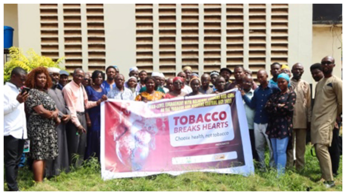
BY: Sulaiman Stom Koroma.
According to the World Health Organization (WHO), tobacco use kills nearly six million people each year, and more than 600,000 of these people are exposed to second-hand smoke. Tobacco kills up to one-half of all its users and remains one of the leading preventable causes of death. Tobacco has no known health benefits. On the contrary, it causes disease, disability, and premature death. In the last two decades, considerable steps have been made globally to decrease the number of tobacco smokers. However, despite these efforts, tobacco consumption is still on the rise at about 4% per annum and has an estimated user base of over 1 billion people. According to the World Health Organization (WHO), about 80% of these smokers live in low and middle-income countries.
Countries in the African Region are experiencing an increasing rate of tobacco use. The fast growth of the population in Sub-Saharan Africa and an increase in consumer purchasing power are leading to larger and more accessible markets in Africa. In addition to that, there are intensive efforts by the tobacco industry to expand African markets.
But the continent is also home to some highest-ranked smoking countries on the planet, with Tunisia estimated at 1,628 cigarettes per adult per year, or about 4.4 per day for every person over 18 years old. Egypt and Libya follow in second and third place respectively.
Dr. William Onzivu is working for WHO Africa he said that More than 50% of all smokers die of a disease known to be smoking-related. Evidence of linkage between smoking and lung cancer, myocardial infarction, respiratory disease, and other smoking-related illnesses. WHO statistics made it clear that in the African region: Between 2002 and 2030, tobacco-attributable deaths are projected to double in low and middle-income countries, including in Africa.
According to Doctor Santigie Sesay the Director of Non-communicable diseases in Sierra Leone, tobacco use kills an estimated 3,300 people, a major driver of widespread ailment and debility, and overheads the under-resourced healthcare system a whooping SLL 108 billion – undermining efforts to achieve universal health coverage in the country.
“In 2017, out-of-pocket healthcare expenditures for tobacco-related diseases were estimated at SLL 45 billion in 2017, having a deleterious impact on poverty levels, inequities, and livelihoods. Given the limited data or research available on this problem of tobacco use, it is even likely that these expenditures may have increased even further. In Sierra Leone, 13-15-year-olds are using tobacco at a depressing rate, and the youth are the most vulnerable as they are deliberately targeted by the tobacco industry”. He said
In addition, the use of tobacco in Sierra Leone costs the ailing economy about SLL 404 billion each year – that is about 1.5% of the country’s GDP in 2017. Apart from the economic loss, tobacco use is also degrading the country’s workforce – and this is a grave problem that needs strategic intervention to reverse the current ugly trend.
Over the past 10 years, the Ministry of Health and Sanitation has been pushing for the enactment of the Tobacco and Nicotine Bill. On the 3rd of February 2009, the cabinet approved the adoption of the WHO Framework Convention on Tobacco Control which President Ernest Bai Koroma signed on the 30th of April 2009, this was ratified by the House of Parliament on the 15th of June 2010. By March 15th, 2017, the Tobacco and Nicotine Bill was ready for ratification thus the Ministries of Internal Affairs, the Ministry of Finance and Economic Development, and the Ministry of Trade and Industry gave their concurrence to the Bill.
The next move, was to table the bill so it could be passed into law, but this process took over 5 years before it was finally passed into law. Meanwhile, WHO has contracted FOCUS 1000 as the NGO to lead in the advocacy and ensure the bill was passed into law before the end of the span of Parliament. “It was a huge task for us, considering the limited time we had We had to engage everything available time to achieve it, We knew it was not going to be easy, but it was a venture worth taking, and it paid off, today we have achieved this great milestone.” Said MB Jalloh CEO FOCUS 1000.
Princess Dugba is the Deputy Minister of Health and Sanitation she told parliament that the purpose of the Tobacco and Nicotine Control Bill is to control and regulate production, manufacturing, importation, packaging and labeling, advertising, promotion and sponsorship, and sale and use of tobacco products and other nicotine products. “The Bill provides for the improvement of public health by limiting the health harms caused by the use of and exposure to tobacco and nicotine by reducing the demand and supply of these products in Sierra Leone. This law will protect millions of our citizens from the health, social, and economic impacts of tobacco use and exposure to tobacco smoke. It will save our present and future generations from disease, disability, and death. It is a law for posterity”. She said.
According to several surveys, 25% of Sierra Leonean adults smoke tobacco. Tobacco use is responsible for around 3,300 deaths each year, 68 percent of which are premature deaths occurring in people aged between 30 to 70 years. Tobacco-attributable disease causes Sierra Leoneans to lose the equivalent of 16,128 years of good health each year. The direct and indirect costs and losses from tobacco use total SLL 404 billion.
Idrissa Kamara is 62 years of age and has been smoking for 40 years now he said that he started smoking when he was a teenager. “I have friends who were smoking and my parents too so the likelihood to start smoking was very visible. Like other teenagers, I just wanted to try it and feel how it tastes, and that’s how it all started”.
Evelyn Mannah works with the Law Officers Department and works on the early stages of the bill “The bill is divided into eleven parts which are; Preliminary with the interpretation of terms, Establishment of the Tobacco and Nicotine Control Council, Functions of the Council, Funds, and Accounts of the Council, Administrative Provisions, Protection from Involuntary Exposure to Tobacco Smoke or Vape, Regulation of Sale and Distribution of Tobacco, Tobacco products, and other Nicotine products, Regulation of Advertisement, Promotion, and Sponsorship of Tobacco, Tobacco products and Other Nicotine Products, Regulation of Manufacture, Importation, and distribution of Tobacco, Tobacco products and Other Nicotine Products, Enforcement and Miscellaneous Provisions”.
A newer influence on tobacco use is the e-cigarette and other high-tech, fashionable electronic “vaping” devices. Often wrongly seen as harmless, and easier to get and use than traditional tobacco products, these devices are a way for new users to learn how to inhale and become addicted to nicotine, which can prepare them for smoking. Abul Kargbo is a regular e-cigarette user, he told me how he became a fan of e-smoking and how he had gotten used to it “I see people using it along the beach, young people mostly, I got interested and fell for it. At first, I went off my senses, my friends had to take me home, but as time went on, I got used to it. It’s really fun and exciting to use”. He said. The tobacco industry spends billions of dollars each year to create and market ads that show smoking as exciting, glamorous, and safe. Tobacco use is also shown in video games, online, and on TV. Studies show that young people who see smoking in movies are more likely to start smoking.
Amadu* is a victim of secondhand smoking, he spoke of how his life is in shambles now because of his father’s mistake “My father was a chain smoker, he smokes at home, in the vehicle and everywhere, I remember telling him about the dangers of smoking and how it will affect him. He turned to me and said, nothing will happen to me. Yes, to date nothing has happened to him but I am now dying of cancer because of secondhand smoking”. He said
For the past months, the bill has been debated intensively by members of parliament who looked at the pros and cons of the bill, and on the 3rd of August 2022 enacted it. The bill is greeted with open hands by many who think it will help greatly to reduce public smoking. “I am pleased that the bill is enacted to stop public smoking which has become rampant lately” Alieu Kargbo. “E-smoking is getting out of hand, so if I hear of a bill like this, I am very happy for it. It was slowly going to damage the health and well-being of our young people”. Mr. Alimany Kamara.
There are no tobacco manufacturers here in Sierra Leone, but the number of importers is unheard of. Mohamed Bah has been importing cigarettes for over 30 years. In a radio interview, he said they will get at everything to ensure the president does not sign the bill “You can’t just wake up one morning and stop our trade, we would not allow this and we can get at whatever it takes to stop the president from signing it”. Edward Jusu is a Civil Society Activist he says tobacco dealers have bought their way in all departments just so that the bill is not signed “This is not the first time they are saying this, this bill has been in parliament for over 11 years now, they bribe their way in all sectors and that’s the reason why we are where we are today”.
According to the laws of Sierra Leone, the president will have to give his assent to the Act before it takes effect. Lawyer Koroma works with the law officer’s department he said that after a bill, The President of Sierra Leone is invested with the power to sign bills into law. While the legislature makes laws and considers policies of the Executive, the Executive implements policies and enforces laws passed by the Legislature. The President’s power to sign bills into law is a part of the checks and balances of Sierra Leone’s democracy. After the president signs a bill, it is returned to the Clerk of Parliament “VETO- In a case where the President refuses to sign the bill, it will be returned to Parliament within fourteen days from the day the bill was received, stating reasons for his refusal. The bill can however become a law if two-thirds of the parliament votes in favor”.
However, in the case of the Tobacco and Nicotine Control Act, this provision seems to have been altered. Since the Act was sent to the president it’s over 6 months ago, he has not signed it nor has the Act been returned to Parliament, which has raised a concern everywhere in the country, asking the question “Where is the Tobacco Act” “we are baffled at this point, were is the Act? we have contacted Parliament and they told us the Act is at State House, State House is saying they haven’t got it yet. We are baffled and don’t know what to do”. Said Mohamed Bailor Jalloh CEO of FOCUS 1000.
During this period, the importers are all over the media calling on the president not to sign and stating all the contributions they have made in the different sectors of government including education. “We have been given scholarships to school children for over twenty years now we have made significant contributions to the government we can only continue to give such support if the Act is not signed,” says one of their members during a radio interview. Reynold Senesie is the FCTC focal person at WHO, he called on the government to adhere to the WHO FCTC which they have signed to “the government has made international commitments and they need to adhere to it, these are international protocols and they should be fully followed, the government should not listen to any distraction for the bill to start working”.
Musa Kallay works with a youth organization in Freetown he said the number of youths who are into smoking is alarming and if serious actions are not taken it will be a very big disaster. But with all these calls for the government to sign the Act, it seems like the importers have won. It took support from the African Tobacco Control Alliance to organize advocacy meetings for religious leaders and civil society organizations to join the call for the president to give his assent to the Act. Two weeks later, a bill that has taken over a decade in parliament and has been missing in action was finally signed by the president.
I am overwhelmed to hear that this Act has been signed, I am battling with TB now because of chain-smoking, I wish this bill was signed 15 or 20 years ago to prevent me from this predicament says Abu* who has been battling with TB for over five years now.
Anyone who starts using tobacco can become addicted to nicotine. Studies show that smoking is most likely to become a habit during the teen years. The younger you are when you begin to smoke, the more likely you are to become addicted to nicotine. But with the enactment of this bill, it’s not a blessing in disguise to end public smoking, create revenue for the government, or get youth and other people to become addicted to e-smoking but a blessing in reality.
It is clear that the importers have money to influence everything they want but this time the will of the people has spoken over money.




